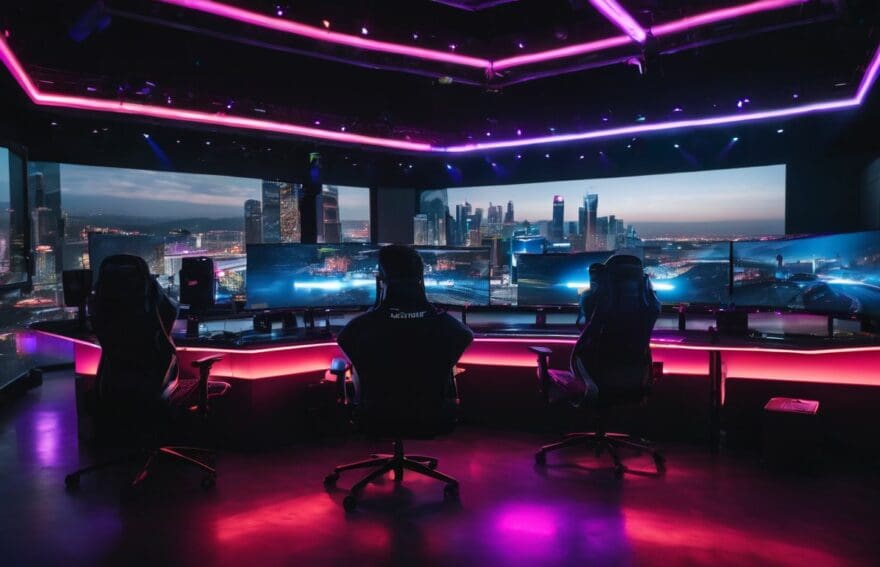ESL: Shaping the Future of International Esports Competitions

Updated On: October 24, 2025 by James Connolly
If you’ve ever felt somewhat adrift in the vast and ever-evolving cosmos of esports, trust us, it’s a feeling many share. It’s precisely because we understand this sense of wonderment (and occasional bewilderment) that we’re absolutely chuffed to celebrate ESL’s 20-year anniversary at the heart of such an exhilarating industry.
Our blog brims with fascinating insights into how ESL is not just participating but truly pioneering within the realm of international competitions – setting the stage for a robust future that will captivate esports aficionados everywhere.
So come along, immerse yourself in our narrative where the world of gaming transforms into global spectacle – it promises to be quite the ride!
The Growth of Esports and the Need for a Strong Foundation
The rapid rise of esports in recent years has led to a surge in international gaming competitions, but there is currently a lack of structure and regulations. As the industry continues to grow, there is an evident need for a unified governing body to provide the necessary foundation for fair competition and player support.
Rise in popularity
Esports has surged in spectators and participants, turning living rooms into arenas where every click or command can lead to victory. With our combined 20 years at ESL, we’ve watched this wave rise, bringing together communities who live for the thrill of online competitive platforms.
Games like Counter-Strike have evolved with releases such as Counter-Strike 2, captivating audiences and reshaping professional gaming.
We see international gaming competitions becoming grander, drawing in fans from all corners of the globe. Our recent merger with DreamHack ignites fresh innovations that resonate deeply within the esports clubs and among streamers.
This phenomenon isn’t just about playing games; it’s a cultural shift towards a world where live entertainment in esports is celebrated across generations.
Lack of structure and regulations
However, amidst the rapid rise in popularity of esports, there is a pressing issue regarding the lack of structure and regulations within the industry. This absence has created challenges related to standardisation and fair play across different gaming platforms and competitions.
As a result, players, teams, organisers and fans face uncertainty about rules, eligibility requirements, and consistency in officiating tournaments at both national and international levels.
Without standardised regulations overseeing key aspects such as player conduct, anti-cheating measures or prize money distribution, competitive integrity may be compromised.
To address these gaps effectively requires well-designed regulatory frameworks that ensure fairness for all involved stakeholders while maintaining an enticing environment for new talent to thrive.
Need for a unified governing body
To address the lack of structure and regulations in the ever-growing esports landscape, there is a pressing need for a unified governing body. Currently, the absence of standardised rules and oversight hinders fair play and consistency across international competitions.
A unified governing body would ensure clear guidelines for players, teams, and organisers while also promoting transparency in decision-making processes. This will not only elevate the level of competition but also provide clarity in resolving disputes and upholding ethical standards.
The establishment of a unified governing body would create a level playing field for all participants, fostering trust among stakeholders within the esports community. With such an organisation in place, players can expect standardised procedures that prioritise their well-being and ensure fair treatment at all levels of competition.
The Esports World Cup Foundation and Its Goals
The Esports World Cup Foundation aims to elevate players and promote fair competition, providing support for esports development while creating a global platform for players. With these goals in mind, the foundation seeks to shape the future of international esports competitions.
Elevating players and promoting fair competition
ESL prioritises elevating players and ensuring fair competition. We aim to provide a global platform for players to showcase their skills while upholding standards of integrity, sportsmanship, and professionalism across all our events.
Through partnerships and initiatives, we are committed to creating an inclusive environment that fosters growth and development in the esports industry.
ESL’s dedication to promoting fair play has led us to establish standards for international competitions, providing equal opportunities for players from various regions. Our goal is not only to elevate established professionals but also nurture emerging talent by offering support and guidance within the competitive gaming landscape.
Providing support for esports development
Supporting the development of esports is crucial for nurturing the next generation of professional players and elevating the global competitive gaming landscape. ESL, in collaboration with industry leaders, has been instrumental in creating an environment that fosters talent growth and provides opportunities for aspiring gamers to shine on a global stage.
By partnering with key stakeholders and investing in talent development programmes, ESL is leading the charge to ensure that emerging players have access to resources that enable their growth and success.
This support not only benefits individual players but also contributes to the overall expansion of esports into new regions, allowing diverse voices and talents to thrive within this dynamic industry.
Creating a global platform for players
The Esports World Cup Foundation aims to create a global platform that will give players from all around the world an opportunity to showcase their talent. This initiative will increase the visibility of players and provide them with a chance to compete on an international stage, thus opening up new opportunities for professional development.
Through our efforts, we aim to build a strong foundation that supports and nurtures diverse gaming communities, granting players access to larger platforms where they can demonstrate their skills and compete at the highest level in various esports tournaments.
Ensuring fair play across all gaming regions is one of our top priorities as we strive towards providing equal opportunities for passionate gamers looking to break into competitive gaming events.
The Impact of the Esports World Cup Foundation
Establishing standards for international competitions, increasing opportunities for players, and fostering collaboration among stakeholders are just some of the ways that the Esports World Cup Foundation is shaping the future of international esports competitions.
If you want to learn more about how this foundation is revolutionising the world of esports, keep reading!
Establishing standards for international competitions
Setting standards for international esports competitions is vital to ensure fair play and credibility. These standards guarantee that all players and teams adhere to the same rules and regulations, creating a level playing field for everyone involved.
With ESL’s experience in shaping the industry over 20 years, our continued commitment to establishing these standards aims to elevate the global esports community while providing an equal platform for all participants.
Implementing standardised guidelines across international competitions will not only foster healthy competition but also enhance the overall gaming experience for both professional and novice players.
Increasing opportunities for players
Esports is creating new and exciting opportunities for players to showcase their skills on a global stage. With the growth of the industry, more championships and online gaming competitions are emerging, providing professional gaming teams with platforms to compete at an international level.
The collaboration between ESL and DreamHack has pushed forward innovations, serving fans and communities across different events and formats, thereby fostering a competitive environment for players worldwide.
Moreover, ESL’s partnership with Qualcomm is revolutionising the esports experience by leveraging technological advancements in gaming. These initiatives are having a significant impact on elevating players’ careers and promoting fair competition in the rapidly evolving world of esports.
Fostering collaboration among stakeholders
Fostering collaboration among stakeholders is crucial for the growth and success of international esports competitions. By bringing together game developers, tournament organisers, sponsors, and governing bodies, we can create a flourishing ecosystem that benefits everyone involved.
Through open communication and shared goals, we can ensure fair play, sustainable monetisation models, and the development of talent across regions. This collaborative effort will elevate the standard of competitions while providing more opportunities for players to showcase their skills on a global stage.
The involvement of all stakeholders also ensures that esports continues to evolve in line with industry trends and insights. With an inclusive approach to decision-making and strategy development, we can tap into diverse perspectives that drive innovation within the competitive gaming scene.
Challenges and Solutions in the World of Esports
Navigating the complex landscape of business models and monetisation in esports can be a daunting task, but finding innovative solutions is crucial for sustainability. Regulation and government support are essential for legitimising esports as a sport, while talent development programmes will ensure a steady stream of skilled players in the industry.
Business models and monetisation
- Sponsorships, advertising, and partnerships
- Selling merchandise and in – game items
- Subscription services and premium content offerings
- Hosting events, tournaments, and leagues
Regulation and government support
Esports regulation and government support play crucial roles in shaping a fair and sustainable competitive gaming environment. Governments can establish policies to recognise esports as an official sport, leading to increased funding and resources for the industry.
- Esports regulation ensures fair competition and protects players’ rights, preventing issues such as match-fixing and doping that could undermine the integrity of tournaments.
- Government support can lead to the creation of dedicated esports facilities, training programmes, and educational initiatives, fostering talent development and skill enhancement among aspiring gamers.
- Collaboration between governments and esports organisations can result in the implementation of standardised regulations across different regions, paving the way for consistent practices in international competitions.
- Partnership with educational institutions under government support can provide opportunities for academic scholarships and career pathways within the esports industry, enhancing its legitimacy as a professional pursuit.
- Regulatory frameworks can also address legal aspects such as player contracts, intellectual property rights, and taxation specific to esports, providing clarity for stakeholders and promoting sustainable growth within the ecosystem.
- Government backing for infrastructural development can enable the hosting of world-class esports events, elevating their scale and impact on local economies while attracting global audiences.
- Recognising esports as an official sport opens doors for visa facilitation for international players, streamlining their participation in global tournaments without bureaucratic hurdles.
- Endorsement from governments can stimulate partnerships with traditional sports organisations, encouraging cross-disciplinary collaboration that enriches both industries with shared resources and expertise.
- Regulatory oversight on broadcasting rights and content censorship aligns esports with media standards while safeguarding viewership experiences tailored for diverse audiences worldwide.
- Clear guidelines regarding health and safety protocols within gaming arenas ensure a secure environment for players, staff, and fans attending live events supported by government mandates.
Talent development
ESL is dedicated to nurturing talent within the esports community. This involves:
- Identifying and nurturing emerging players with potential through scouting programs.
- Providing comprehensive training and development opportunities to help players reach their full potential.
- Offering mentorship and guidance from experienced professionals to help young talents grow and excel in their respective games.
- Creating pathways for players to transition into professional careers through developmental leagues and tournaments.
The Future of Esports with the Esports World Cup Foundation
The Esports World Cup Foundation is poised to revolutionise the future of esports by expanding into new regions and bringing about revolutionary changes and innovations. With its global platform for players, the foundation is committed to making esports a mainstream phenomenon around the world.
Expanding into new regions
ESL is venturing into uncharted territories, reaching out to new regions across the globe. Our goal is to bring the exhilarating world of esports closer to passionate gamers worldwide.
The expansion opens up exciting opportunities for novice gamers to explore and immerse themselves in the dynamic and evolving landscape of international esports competitions. This strategic move aligns with our mission to foster inclusivity and provide a platform for diverse gaming communities to showcase their skills on an international stage.
The extension into new regions not only broadens our reach but also enriches the global esports ecosystem by tapping into untapped talent pools and cultivating fresh competitive dynamics.
Revolutionary changes and innovations
Revolutionary changes and innovations in the world of esports are reshaping the landscape, offering players and fans immersive experiences like never before. The launch of Counter-Strike 2 has marked a significant shift in competitive gaming, setting new standards for gameplay and spectator engagement.
Additionally, ESL’s collaboration with Qualcomm is set to transform the esports and gaming experience through cutting-edge technology integration, promising to elevate competition to unprecedented levels.
Furthermore, the merger between ESL and FACEIT has brought together over thirty years of expertise in competitive gaming, fostering an environment ripe for innovation and groundbreaking developments.
Bringing esports to the mainstream
Revolutionary changes and innovations have propelled esports onto the global stage, set to become the future of entertainment. ESL’s partnership with Qualcomm has paved the way for a revolutionised gaming experience, enhancing accessibility and interactivity for both passionate gamers and novices alike.
With significant investment in the Middle East, esports is on an upward trajectory towards mainstream recognition. The constant evolution and growth in this industry promise a future that caters to diverse audiences, offering unparalleled gaming experiences while solidifying its position as a major player in international competitions.
ESL’s 20 years of experience positions it at the forefront of shaping competitive gaming globally, ensuring that potential barriers are dismantled to bring esports into mainstream culture.
Conclusion
In conclusion, ESL is at the forefront of shaping international esports competitions. The company’s 20 years of experience and innovative partnerships position it as a key player in the industry.
As ESL continues to push boundaries and drive advancements, it’s clear that the future of competitive gaming is in good hands. With its dedication to elevating players, fostering collaboration, and expanding into new regions, ESL is set to revolutionise the world of esports on a global scale.
By creating opportunities for players and setting new standards for international competitions, ESL is paving the way for an exciting future in competitive gaming.
FAQs
1. What is ESL in the context of esports?
ESL stands for Electronic Sports League, and it’s a major organisation that runs international esports competitions across various video games.
2. How does ESL shape the future of esports?
By organising large-scale international tournaments and enforcing professional standards, ESL plays a key role in driving the growth and recognition of competitive gaming worldwide.
3. Can anyone participate in ESL esports competitions?
Yes, players from around the globe can compete in many levels of ESL tournaments, from amateur to professional ranks.
4. What makes ESL important for the global esports community?
ESL provides structured competition platforms, helps develop talent at all levels, and brings together players and fans from different countries to celebrate competitive gaming as a unifying sport.



